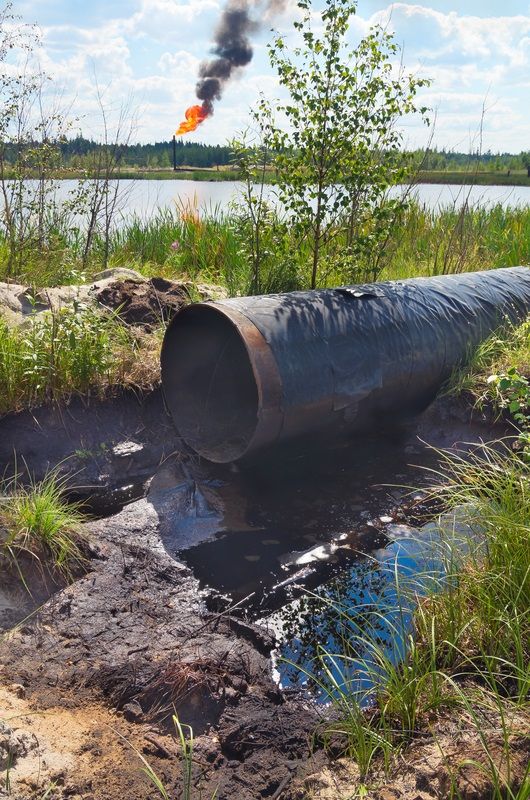Water Contamination Riskier for Companies in Wake of Rulings
Turn to the nation’s most objective and informative daily environmental news resource to learn how the United States and key players around the world are responding to the environmental…
Contaminating waterways with gasoline, chemicals, or sewage is now riskier and costlier because federal courts have found a novel way to pinpoint who is responsible.
Under the Clean Water Act, any discharge of pollutants from industrial pipes or drains directly into protected waterways requires a permit under the National Pollutant Discharge Elimination System program. Recently two federal appeals courts ruled that companies and municipalities can be sued for contaminating surface waters if the pollution is traced via groundwater to the source of the spill or release.
“If you can trace the pollutant to that point source even if that source didn’t ‘directly’ add that pollutant into the water, there is potential liability,” Karen Hansen, principal in the Austin office of Beveridge & Diamond P.C., told Bloomberg Environment April 13.
Both court decisions have drawn the attention of trade groups representing the oil and gas, mining, and municipal wastewater sectors. They all could be faced with increased permitting costs and related liabilities if they fail to obtain Clean Water Act permits for indirect discharges of pollution to federally protected waters via groundwater.
But Hansen said that companies or cities can’t know in advance if a spill or leak will occur, and so they have no way to know what kind of permit they would need.
The fine is as high as $52,414 a day for Clean Water Act violations.
The court decisions were handed down by the U.S. Court of Appeals for the Fourth Circuit in Upstate Forever v. Kinder Morgan Energy Partners L.P. on April 12, and by the Ninth Circuit in Hawaii Wildlife Fund v. County of Maui in February.
Kinder Morgan Case
In the Fourth Circuit case, the court ruled that two environmental advocacy groups, South Carolina-based Upstate Forever and Georgia-based Savannah Riverkeeper, can sue Kinder Morgan Energy Partners, the Texas-based energy infrastructure company. The court found that pollution in Savannah River tributaries could be directly traced via groundwater to the Kinder Morgan Plantation Pipeline.
The company could be held responsible because it didn’t obtain a discharge permit for the gasoline that spilled out of its underground pipeline in South Carolina and contaminated the tributaries some 1,000 feet away, the Fourth Circuit ruled.
Companies, cities, and even homeowners finding themselves in a predicament similar to Kinder Morgan’s also could face potential risk, Sarah Bell, a partner with the San Francisco office of Farella Braun + Martel LLP, told Bloomberg Environment.
Bell said a spill that results in pollutants reaching groundwater with a direct connection to federally protected waters can result in Clean Water Act liability under the Fourth Circuit decision.
The success of such a lawsuit, however, would depend on a number of factors, Bell added. For instance, she said, a citizen suit would have to prove whether the company tried to obtain a pollution discharge permit, whether there was a direct link “conclusively established” between the groundwater where the spill occurred and the receiving water that was contaminated, and whether the pollutants did reach those receiving waters.
Broader Than Ninth Circuit Ruling
The Fourth Circuit ruling has aspects similar to the Ninth Circuit’s February decision in Hawaii Wildlife Fund v. County of Maui. The court found Maui County in Hawaii was liable for wastewater it injected underground that migrated through groundwater to the Pacific Ocean. In both rulings, the courts found that groundwater can be regulated under the Clean Water Act when it acts as a conduit through which pollutants from a chemical or oil spill, sewage backup, or wastewater injection can be traced to protected rivers, lakes, and estuaries.
The Fourth Circuit’s ruling is more concerning because it has a broader reach than the Ninth Circuit’s decision, Brent Fewell, founder of the Earth & Water Law Group, told Bloomberg Environment.
The Washington-based legal organization works on behalf of industry and other clients on shaping and developing environment-related policies.
“What is striking about this decision is that it applies to residual contamination, or contamination that occurred in the past,” Fewell said. “It doesn’t matter when the spill occurred. If it reaches jurisdictional surface waters then it is subject to the Clean Water Act permitting program.”
Company’s Rationale Rejected
Frank Holleman III, senior attorney for the Southern Environmental Law Center, who represented the environmental groups in the Fourth Circuit, said the judges dismissed Kinder Morgan’s rationale for avoiding liability because it would have a “blown a hole through the Clean Water Act.”
Under Kinder Morgan’s rationale, Holleman said, “The pipeline literally had to be in the stream or by the water’s edge for the law to apply.”
The company’s attorneys also argued that Kinder Morgan was no longer liable because the point source—the ruptured gasoline pipeline—was repaired and no longer responsible for contaminating the tributaries.
But Fourth Circuit Judges Roger Gregory and Barbara Keenan, in contrast to their fellow jurist Henry Floyd, agreed with Holleman’s reasoning.
“If the presence of a short distance of soil and ground water were enough to defeat a claim, polluters easily could avoid liability under the [Clean Water Act] by ensuring that all discharges pass through soil and ground water before reaching navigable waters. Such an outcome would greatly undermine the purpose of the Act,” the judges wrote.
Floyd disagreed with his colleagues, saying that Kinder Morgan’s liability ended when it repaired the pipeline, which was the source of pollution.
For pollutants to be added from the pipeline, Floyd said, the pipeline must convey, transport, or introduce the pollutant to the protected waters, as the law requires. The facts, however, demonstrate that, “There is ongoing groundwater migration from the spill site, which does not amount to a Clean Water Act violation and cannot support a citizen suit.”
Issue of Ongoing Contamination
But Gregory and Keenan were adamant that the plain meaning of the law makes it clear that a point source may be the starting point or cause for a pollution release, but “that starting point need not also convey the discharge directly to navigable waters.”
Fewell, of the Earth & Water Law Group, said this interpretation won’t sit well with either states, the EPA, or localities. He pointed to the thousands of contaminated Superfund sites that would require pollution discharge permits when contaminants flow underground to surface waters.
About 30 percent of the nation’s wastewater and drinking water pipes are near major waterways. Leaks in these pipes could lead to Clean Water Act enforcement actions under this ruling, Fewell said.
Maui County attorneys already have informed the Ninth Circuit that they plan to ask the Supreme Court to review the decision.
Hunton & William Attorneys Sam Brown and Michael Shebelskie, who represented national industry organizations for the municipal wastewater utilities, counties, and investor-owned utilities, declined to comment on the wider implications of the decision.
Kinder Morgan told Bloomberg Environment that it is reviewing the decision and weighing its next steps.




